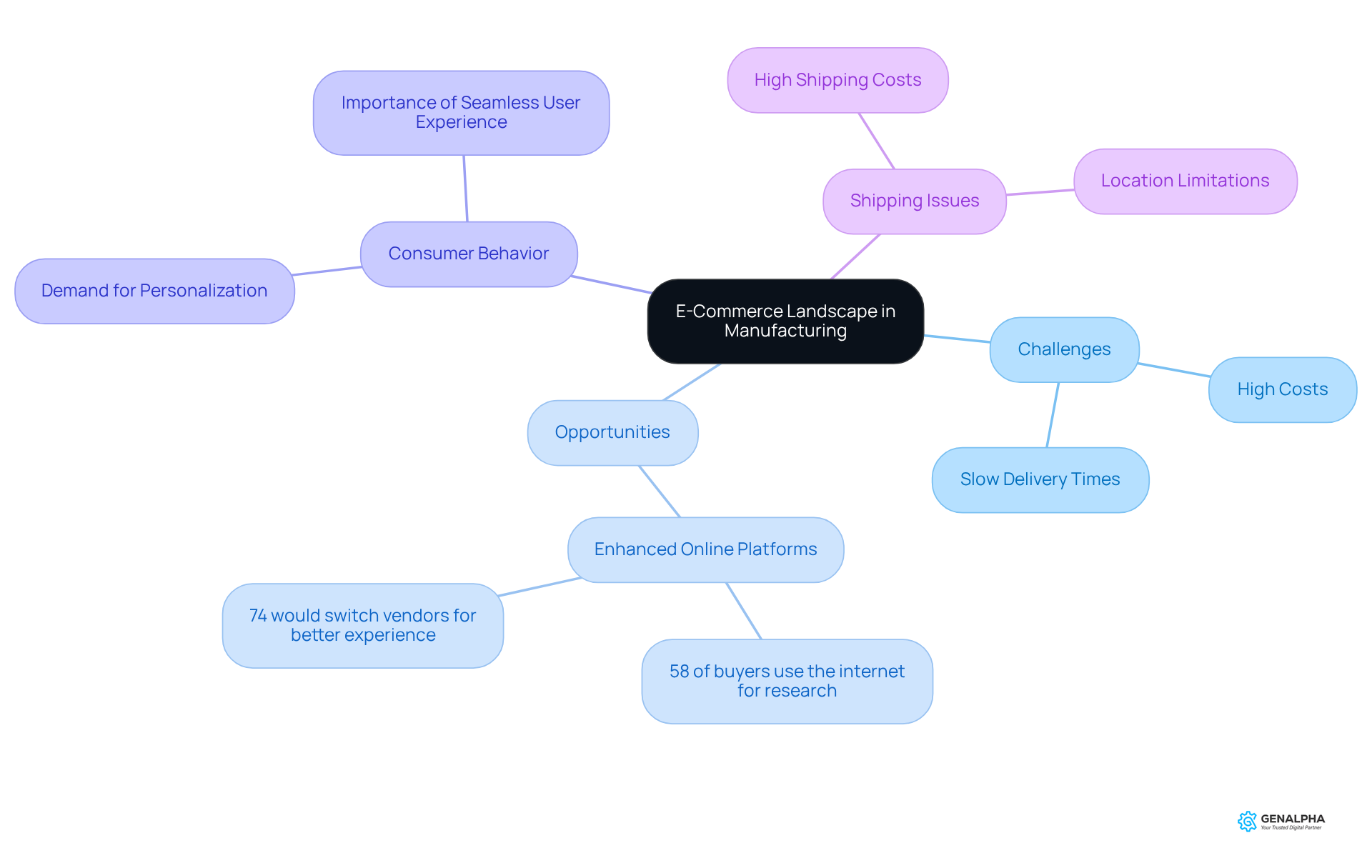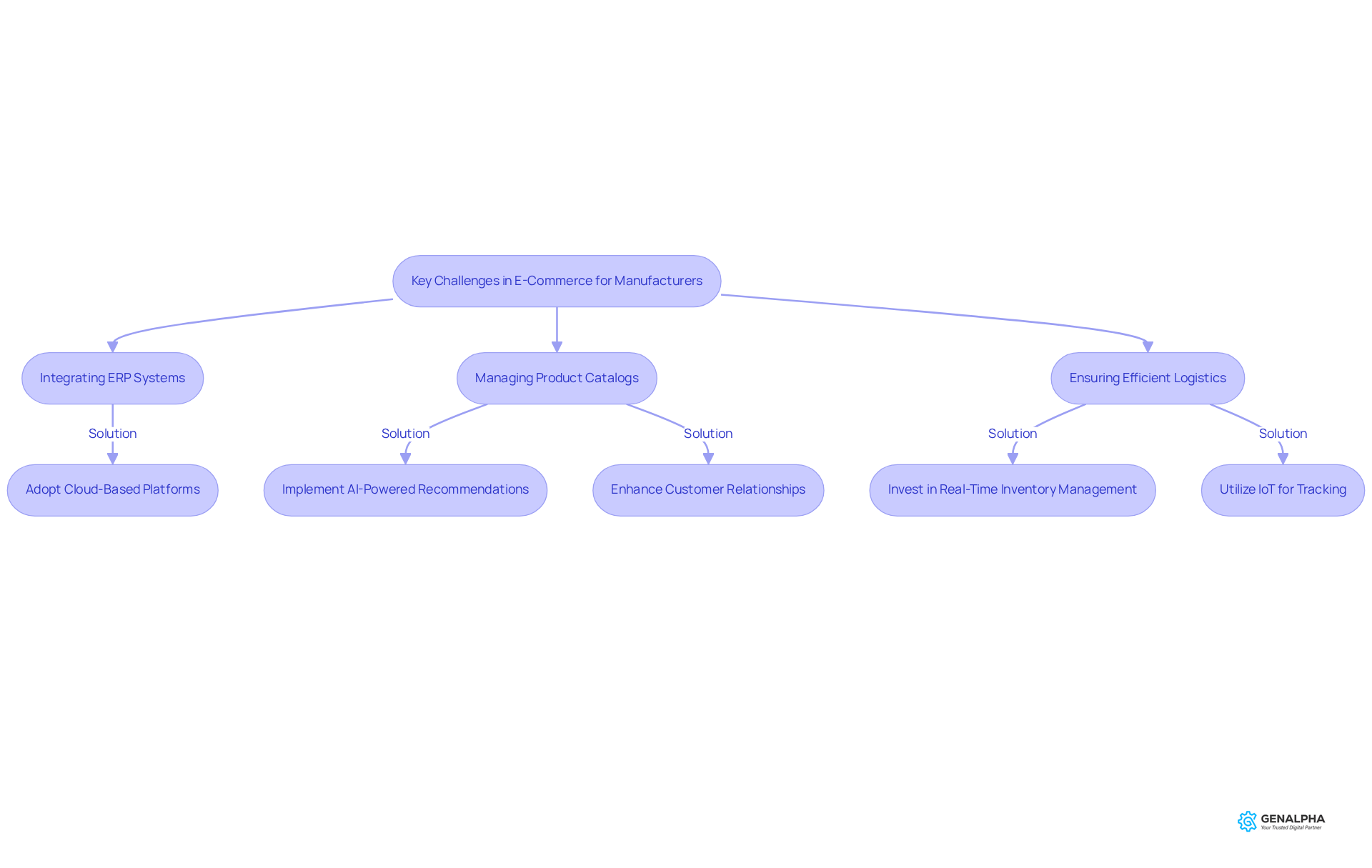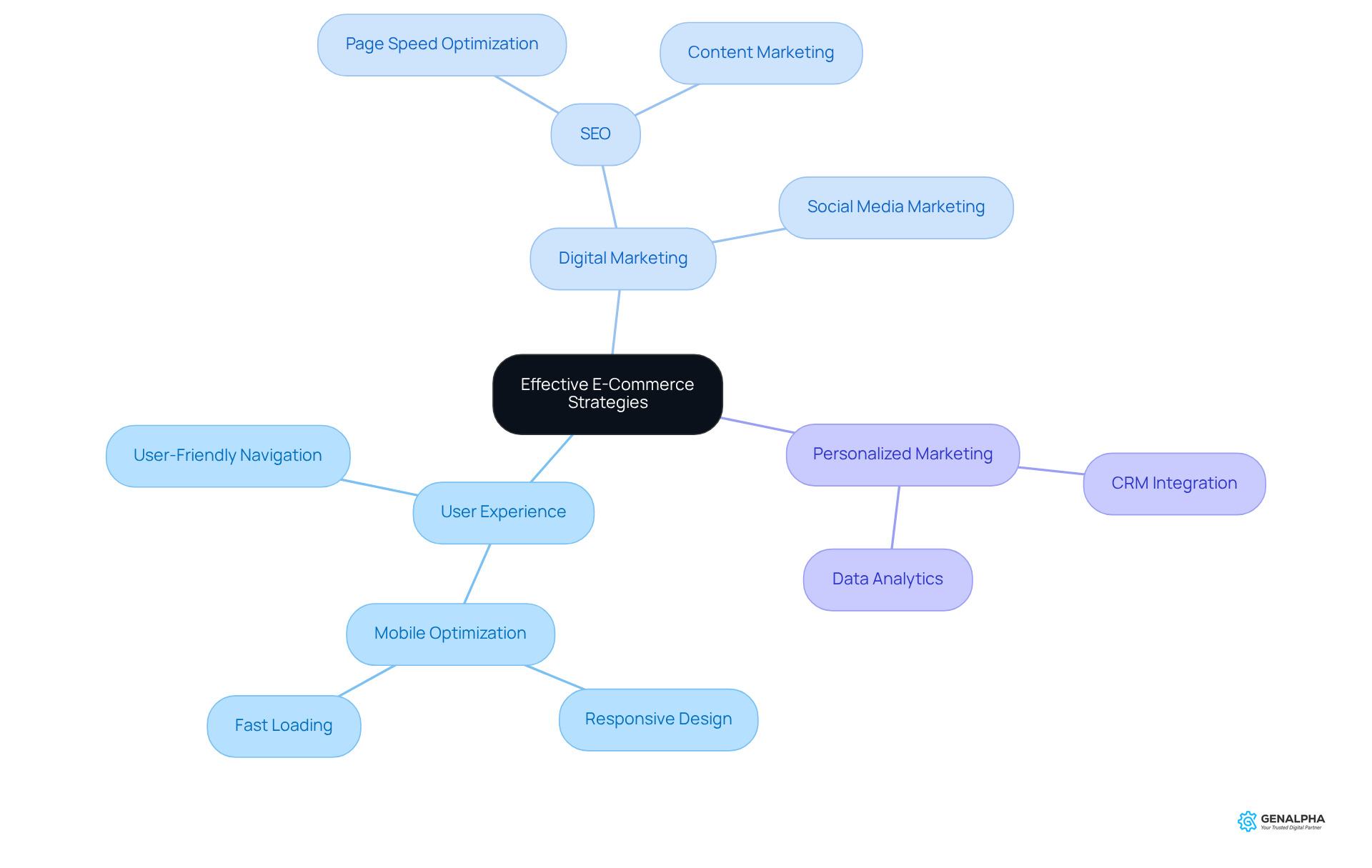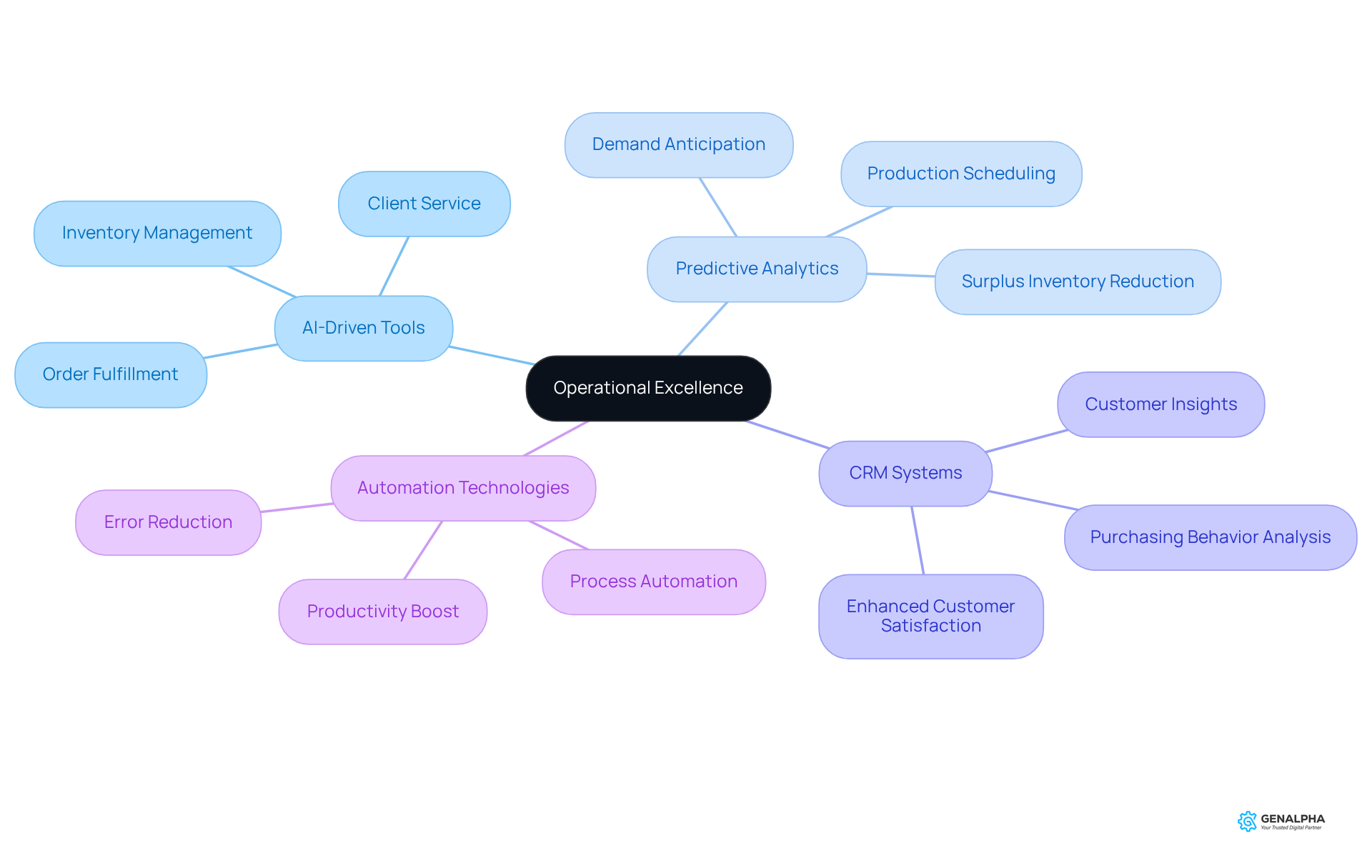Overview
The manufacturing sector faces significant challenges in enhancing e-commerce, particularly in navigating the complexities of B2B transactions. To address these issues effectively, four key strategies emerge:
- Focusing on user experience
- Implementing robust digital marketing
- Fostering personalized engagement
- Leveraging advanced technology
Each of these strategies is not just beneficial but essential for manufacturers aiming to improve their online presence. Data indicates that enhanced online experiences can lead to substantial increases in customer satisfaction and sales, underscoring the necessity of these approaches. By adopting these strategies, manufacturers can position themselves to thrive in the competitive e-commerce landscape.
Introduction
The manufacturing sector is experiencing a significant transformation as e-commerce reshapes traditional business models.
With a remarkable $1.8 trillion market emerging, manufacturers face both extraordinary opportunities and substantial challenges in the digital landscape.
This article delves into crucial strategies that can empower manufacturers to bolster their online presence, optimize operations, and ultimately enhance sales in an increasingly competitive arena.
How can manufacturers adeptly navigate the complexities of e-commerce to not only survive but thrive in this swiftly evolving marketplace?
Understand the Unique E-Commerce Landscape in Manufacturing
The environment of e commerce for business for manufacturers presents distinct challenges and opportunities that set it apart from conventional retail. E commerce for business in manufacturing often involves detailed specifications, bulk ordering, and B2B transactions, necessitating platforms capable of managing these complexities.
Manufacturers must ensure that product information is comprehensive and easily accessible, as 58% of B2B industrial buyers utilize the internet for product research. Furthermore, 74% of B2B purchasers would switch vendors for an improved web store experience, underscoring the imperative for producers to enhance their online platforms.
Understanding consumer behavior is crucial; thus, manufacturers should prioritize a that streamlines the buying process. Implementing features such as product configurators and CPQ (Configure Price Quote) software can significantly bolster client engagement, enabling buyers to customize products to their specific needs. This tailored approach not only boosts client satisfaction but also drives sales by effectively addressing the unique requirements of patrons.
Additionally, producers must confront shipping challenges, including high costs and slow delivery times, to improve the overall customer experience. As demand for e commerce for business continues to surge, with projections indicating a shift to a $1.8 trillion market, manufacturers must adapt swiftly to seize these opportunities and maintain competitiveness.

Identify Key Challenges in E-Commerce for Manufacturers
Producers encounter significant challenges in e commerce for business, particularly in integrating current systems, managing complex product catalogs, and ensuring efficient logistics. A major hurdle is the integration of online commerce platforms with legacy ERP systems, which frequently leads to data silos and operational inefficiencies. Notably, statistics reveal that:
- 64% of ERP projects face delays due to scope changes, underscoring the complexities inherent in these integrations.
- Only 26% of employees fully leverage ERP capabilities, further complicating these issues.
Manufacturers often find it difficult to maintain accurate inventory levels across various sales channels, resulting in stockouts or overstock situations that can adversely affect sales performance. To address these challenges, producers should invest in for business that provide seamless integration features and real-time inventory management.
For instance, adopting cloud-based platforms can greatly enhance flexibility and scalability, enabling producers to swiftly respond to market demands and optimize their inventory management processes. Successful case studies abound, showcasing companies that have streamlined their operations by integrating IoT devices for real-time tracking and automated ordering, thereby boosting efficiency and cutting costs.
Furthermore, 70% of firms utilizing ERP analytics report improved decision-making, reinforcing the necessity for effective integration of online commerce with ERP systems. As Mike Patel emphasizes, understanding the ideal customer is crucial for effectively managing complex product catalogs, and avoiding rushed or misinterpreted ERP implementations can help producers sidestep common pitfalls.

Adopt Effective Strategies for E-Commerce Implementation
To thrive in the realm of e commerce for business, producers must strategically navigate several critical areas. First and foremost, prioritizing user experience through mobile optimization is essential. With over 59% of , ensuring that websites are responsive and load swiftly can drastically reduce bounce rates and elevate conversion rates. For example, JK Industries experienced a remarkable 50% increase in conversion rates from mobile visitors after optimizing their website, underscoring the significant advantages of mobile optimization.
Secondly, producers should harness digital marketing strategies, including search engine optimization (SEO) and content marketing, to attract visitors to their platforms for e commerce for business. Implementing effective SEO practices—such as optimizing page speed, utilizing schema markup, and ensuring proper site indexing—can enhance visibility in search engine results, driving organic traffic. Additionally, creating informative content that addresses client pain points positions manufacturers as industry leaders and builds trust with potential buyers.
Lastly, delivering personalized experiences through targeted marketing campaigns can substantially boost engagement and loyalty. By integrating manufacturing websites with relationship management (CRM) systems, producers can streamline lead management and enhance client interactions. Leveraging data analytics to gain insights into client preferences enables manufacturers to tailor their offerings and promotions effectively. This approach not only enriches the client experience but also fosters long-term relationships, ultimately facilitating sustained growth in the competitive landscape of e commerce for business.

Utilize Technology and Analytics for Operational Excellence
Manufacturers face significant operational challenges in today's competitive landscape. To achieve operational excellence, they must harness advanced technologies and analytics. AI-driven tools play a crucial role in optimizing essential processes such as inventory management, order fulfillment, and client service. For example, predictive analytics empowers producers to anticipate demand with enhanced precision, allowing them to refine production schedules and reduce surplus inventory. As Taiichi Ohno, the father of the Toyota Production System, wisely stated, 'Improvement usually means doing something that we have never done before.' Notably, statistics reveal that organizations utilizing predictive analytics can reduce inventory costs by up to 20%, significantly enhancing their operational efficiency.
Furthermore, the integration of relationship management (CRM) systems enhances interactions by providing valuable insights into purchasing behaviors and preferences. By analyzing this data, producers can make informed decisions that drive efficiency and elevate customer satisfaction. Additionally, investing in automation technologies further reduces manual errors and boosts productivity, ultimately leading to increased profitability. As the manufacturing landscape evolves, embracing these technologies is essential for staying competitive and achieving sustainable growth. Organizations that neglect operational excellence in their digital transformation initiatives may encounter significant challenges, as highlighted by industry experts. Therefore, is crucial for manufacturers aiming to modernize their operations.

Conclusion
Manufacturers navigating the e-commerce landscape must confront distinct challenges and seize opportunities that set them apart from traditional retail. By emphasizing the necessity for comprehensive product information and a seamless user experience, manufacturers can enhance their online platforms to meet the evolving demands of B2B buyers. Adopting tailored solutions and addressing shipping challenges not only boosts customer satisfaction but also positions producers competitively in a rapidly growing market.
Key strategies for successful e-commerce implementation include:
- Prioritizing mobile optimization
- Leveraging digital marketing
- Utilizing advanced technologies such as AI and analytics
Manufacturers are encouraged to invest in user-friendly platforms that streamline the buying process while integrating effective marketing strategies to attract and engage clients. Moreover, robust technologies can help overcome operational hurdles, facilitating better inventory management and enhancing decision-making capabilities.
Ultimately, embracing these strategies and technologies is essential for manufacturers aiming to thrive in the competitive e-commerce environment. As the manufacturing sector continues to evolve, proactive adaptation and innovation will enhance operational excellence and foster lasting relationships with customers. Manufacturers are urged to take decisive steps toward implementing these best practices, ensuring they remain at the forefront of the e-commerce revolution in the manufacturing industry.
Frequently Asked Questions
What makes e-commerce in manufacturing different from conventional retail?
E-commerce for manufacturing involves unique challenges and opportunities, such as detailed specifications, bulk ordering, and B2B transactions, requiring specialized platforms to manage these complexities.
Why is product information important for manufacturers in e-commerce?
Comprehensive and easily accessible product information is crucial because 58% of B2B industrial buyers use the internet for product research, and a better online experience can influence purchasing decisions.
How can manufacturers improve their online platforms?
Manufacturers can enhance their online platforms by focusing on user experience and implementing features like product configurators and CPQ (Configure Price Quote) software, which allow buyers to customize products to their needs.
What impact does a good web store experience have on B2B purchasers?
A good web store experience is significant, as 74% of B2B purchasers would consider switching vendors for an improved online shopping experience.
What shipping challenges do manufacturers face in e-commerce?
Manufacturers face challenges such as high shipping costs and slow delivery times, which need to be addressed to enhance the overall customer experience.
What is the projected growth of e-commerce for business in manufacturing?
The e-commerce market for business in manufacturing is projected to shift to a $1.8 trillion market, indicating significant growth and the need for manufacturers to adapt quickly to remain competitive.




